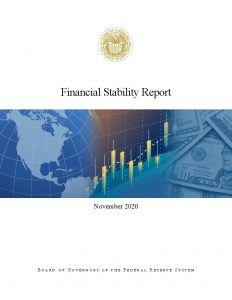The US Federal Reserve’s semi-annual Financial Stability Report presents the Fed’s framework for assessing the resilience of the US financial system along with their current assessment of said resilience. A two-page call-out section entitled “The Implications of Climate Change for Financial Stability” in the just-published November 2020 Financial Stability Report is a clear statement that climate change is a risk to the stability of the US financial system that must be considered and addressed by financial regulators.
 Coming on the heels of the comprehensive September report prepared for the Commodities Futures Trading Commission, this should accelerate the momentum toward other US financial regulatory agencies taking similar steps. As the CFTC report and others have pointed out, regulatory agencies already have the necessary authority to take meaningful action, and multiple agencies doing so will truly move the needle.
Coming on the heels of the comprehensive September report prepared for the Commodities Futures Trading Commission, this should accelerate the momentum toward other US financial regulatory agencies taking similar steps. As the CFTC report and others have pointed out, regulatory agencies already have the necessary authority to take meaningful action, and multiple agencies doing so will truly move the needle.
There is a lot packed into these two pages. One particularly notable example is its treatment of time horizons. This assessment is not just reacting to the confluence of the most active Atlantic hurricane season in history and massive Western wildfires. Those are indeed acute climate hazards that
“can quickly alter, or reveal new information about, future economic conditions or the value of real or financial assets.”
The assessment also highlights near-term risks from chronic climate shifts – such as sea level rise – that many in the investment community have disregarded because they seem too far in the future:
“Moreover, in the presence of rapid shifts in public perceptions of risk, chronic hazards (like a slow rise in sea levels) have the potential to produce similar abrupt repricing events.”
There is more – thoughtfully structured in a single-topic callout, “The Implications of Climate Change for Financial Stability” is worth reading for its framing of the issues as well as for its call to action.
